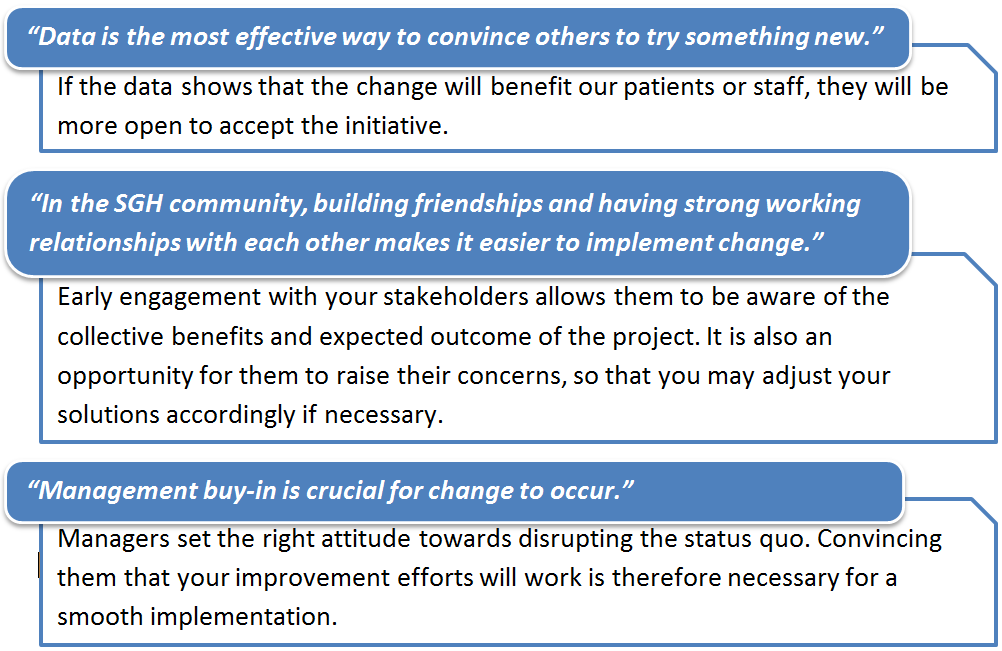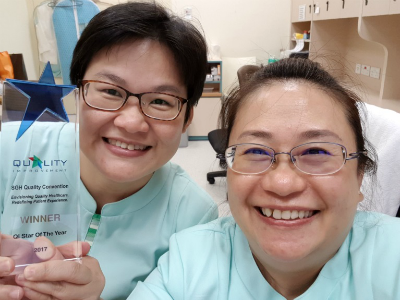Meet Dr Tan Hui Li, SGH’s 2017 Quality Improvement (QI) Star of the Year. Her experiences and insights in challenging the norm enlightened Service Ops Executive Bryan Chua, despite him being a QI Coach.
While preparing for my interview with Hui Li, I came across at least 10 QI projects she was involved in. Two were submitted for the national Innovation and Quality Circle (IQC) competitions, which showcase best practices in Singapore. Her work on reducing Ventilator Associated Pneumonia is the only QI project in SGH to win the highest IQC recognition – Star Award – since 2012.
As a QI Coach myself, I knew Hui Li would be able to offer useful tips in the interview. But it turned out that she has been playing an even larger role in QI than I had expected.
“If we don’t have the courage to think out of the box and challenge the accepted norms, our work procedures and the quality of care for our patients will never improve.”
– Dr Tan Hui Li, Nurse Clinician (APN), MICU
It ain’t broke but we should still fix it
An Advanced Practice Nurse in MICU, Hui Li started her QI journey 12 years ago when she was a Staff Nurse. But like all new beginnings, there were obstacles to overcome.
In her first QI project, Hui Li wanted to change the way Central Venous Pressure (CVP) lines were used.
“Back then, the traditional practice was to attach the CVP to the patient’s arm. However, research then had shown that tying it to the arm restricts blood flow and affects CVP readings,” she recounted. To change this widely used practice, Hui Li had to find a way to convince the nurse managers and doctors, through an evidence based and highly systematic method.
“QI would be the most systematic and accepted approach to changing practices. That’s how I got started in QI projects,” she explained. But one of the biggest problems that she faced was convincing stakeholders to change.
In another of her projects, Hui Li wanted to reduce the sedation levels used on patients undergoing mechanical ventilation to minimise risk of potential harmful effects of sedation and to reduce patients’ length of stay in the hospital. However, she faced resistance from the staff, who argued that “there’s nothing wrong with our current practice, and this new way is more work which might not translate to much benefits compared to what we are doing now.”
Secrets to the art of persuasion
Having learnt from her project experiences, Hui Li now knows better in garnering support from stakeholders. She had the following advice to share.

Care to change
Hui Li’s cross-functional skills in QI and in clinical practice make her an effective agent for change. She credited her growth to the guidance given by her supervisor and mentor, Dr Irene Too, who nominated Hui Li for the 2017 QI Star of the Year award.

Proud to change - Hui Li (left) and mentor Irene.
“I’m happy that Hui Li won, because she has done so much to improve the care for our patients. It’s great that she is getting recognised for her work,” Irene said with a warm smile. “She has now become a great source of knowledge and a wonderful mentor to those around her.”
When we asked Hui Li to sum up her thoughts on QI in SGH, the QI Star said: “Dare to change. In our society, the natural tendency is to follow rules and keep the status quo. Hence, it is difficult to convince others to do things differently, even if it was for the better. But if we don’t have the courage to think out of the box and challenge the accepted norms, our work procedures and the quality of care for our patients will never improve.”
Thank you, Hui Li, for being a strong advocate and practitioner of QI. You are truly deserving of the QI Star of the Year award!
This is a Quality Improvement article contributed by Bryan Chua, Service Operations. Read more QI articles at QI FunBites.
We love mail! Drop us a note at [email protected] to tell us what you like or didn’t like about this story, and what you would like to see more of in LighterNotes.
